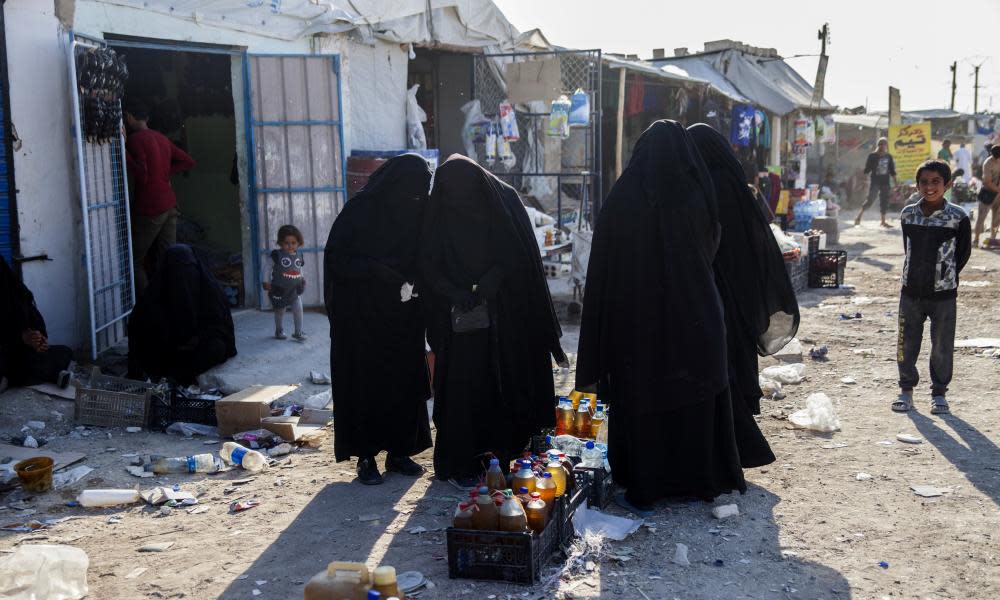France must rethink case of IS-linked women refused re-entry, rules ECHR

The European court of human rights has condemned France over its refusal to repatriate French women who travelled to Syria with their partners to join Islamic State and are currently being held with their children at Kurdish-run prison camps.
The ruling will be studied closely by other countries who still have citizens detained in camps in north-eastern Syria, including the UK.
The Strasbourg-based court – which is not a body of the European Union – ruled that Paris must swiftly re-examine requests made by the parents of the two women that they should be allowed to return to France with the children they gave birth to in Syria. The judges found that France’s refusal to repatriate the women and children was in violation of the right of a person to “enter the territory of the state of which they are a national”.
The ruling did not grant a general right to repatriation, but said there should be safeguards against any potentially “arbitrary” decision-making. It said an independent body should be able to examine decisions made about individuals. France had not provided sufficient reviews to ensure that its refusal to repatriate was not arbitrary. France must now re-examine the cases of the women and their children and provide guarantees on its decision-making process.
The families of the two French women had argued that their prolonged detention in Syria exposed them and their children to inhumane and degrading treatment, and violated their right to respect for family life.
The two women had left France for Syria in 2014 and 2015 when they were in their 20s. Now in their 30s, one has two children aged eight and six, and the other has a three-year-old child. They had lived in IS territory where they were captured in 2019, and are believed to have been held with their children in detention in Syria ever since, in camps including those at al-Hawl and al-Roj.
The parents who lodged a case for them to be returned to France had said that malnutrition and disease were rife in the camps. Human rights watchdogs have warned that in the camps, people face hunger, thirst, poor sanitation, inadequate shelter and threat of violence and exploitation.
One father who had filed a case for his daughter told France Inter radio: “I’m relieved, because it has been a three-year fight.” He said it was remarkable that the case had to go all the way to the ECHR. He said of his daughter and grandchild in the camp: “I hope they won’t spend another winter there.”
France, which saw more of its citizens join IS in Syria than any other European country and has suffered a series of deadly terrorist attacks since 2015 that have killed more than 250 people, had for years resisted calls by human rights groups to repatriate women who left to join IS. France viewed them as “fighters” who should be tried where they were accused of committing crimes. Paris had argued that citizens who joined jihadist networks in Syria and Iraq would pose security risks if returned home.
Related: UK ‘colluding in torture’ by leaving women and children in Syria camps
France initially put in a place a case-by-case policy of bringing children back to France without their mothers. But in recent months, Paris changed its approach. In July, Paris moved to repatriate 16 women and 35 children, some of them orphans, in chartered planes. Upon arrival in France, eight women were taken into custody for questioning and the other eight were detained on arrest warrants. The children were placed in the care of social services.
In reaction to Wednesday’s Strasbourg ruling, the government spokesperson Olivier Véran cited the repatriations this summer, saying that France had “not waited for the European court decision” to “move forward” and that each case would be examined “meticulously”.
It is estimated that there are still about 100 French women and 250 children in Syrian prison camps.
It emerged this week that those repatriated in July included the widow of one of the attackers at the Bataclan concert venue in Paris in November 2015, where 90 people were killed at a rock gig. The woman has been charged with associating with terrorists.
Most of the women and children in the camps were captured by Syrian Kurdish fighters, ground troops in the US-led coalition against the terror group, when fleeing IS territory after the fall of Baghuz in 2019.
The UK has also faced pressure from MPs and human rights groups to repatriate women and children from Syrian camps. So far, the UK has repatriated some children from the camps, but no women.
An estimated 15 to 20 individuals and their families who originally came from Britain are among those detained in north-east Syria, including some whose citizenship has been removed.
Britain continues to argue that the women pose a national security threat. In the case of some, including Shamima Begum, who left London aged 15 with two schoolfriends, the government has removed their UK citizenship.
Other European countries such as Belgium and Germany have recovered most of their citizens who left to join the jihadist fight in Syria.

 Yahoo News
Yahoo News 
